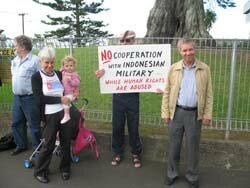19 November 2008
Ties with Indonesia quietly renewed
1 June 2007
By Joseph Barratt: Te Waha Nui Online
New Zealand’s military ties were quietly re-established with Indonesia last month, despite ongoing concerns of human rights abuses.
Foreign Affairs Minister Winston Peters announced the move late last year, and last month an Indonesian officer arrived in New Zealand for military training.
Ties were cut in 1999 because of human rights abuses by Indonesia during the bloody invasion of East Timor.
The Indonesian Government is yet to hold anyone responsible for the conflict that saw between 100,000 and 200,000 people, more than 20 per cent of East Timor’s population, killed in their struggle for independence, say human rights groups.
Defence Minister Phil Goff claims Indonesia has made vast improvements since the invasion. He points out that over the past few years Australia, the US and the UK have all reintroduced military ties.
“Indonesia has made impressive steps to strengthen democracy,” he says. “Sufficient good things have happened so [we need] to acknowledge they have made steps towards reform.”
This is despite ongoing human rights abuses in the Indonesian-controlled West Papua, where there is an enduring struggle for independence.
 |
| MP Keith Locke was part of a small protest outside army headquarters in Auckland. |
Green Party challenge
At a small protest outside the New Zealand Army headquarters in Auckland, Green Party foreign affairs spokesperson Keith Locke challenged Goff’s assertions, asking whether the New Zealand Government’s decision was one of principle or merely followed other countries.
But in emails to Locke, Peters cited a number of examples of improvements in Indonesia.
They included the “removal of the armed forces from an active role in politics, the establishment of civilian control over the military, the removal of the armed forces from commercial activity, and the strengthening of military professionalism - including respect”.
Indonesian Human Rights Committee chair Maire Leadbeater says the New Zealand Government’s move defies logic.
While conceding there has been some democratic reform, she says the Indonesian military was still “a law unto themselves”.
She says Indonesian armed forces get “70 per cent of their funding from commercial activities” and are still involved in protection rackets, illegal logging and prostitution.
The Green Party has also shown its disapproval at the Government’s decision, citing that in 1999 Goff, then foreign affairs minister, argued for the suspension of ties because no Indonesian military officers had been held legally responsible for the killings in East Timor.
Since that continues to be the case, military links should not be resumed, the party says.
Goff claims that the Indonesian military “proved themselves responsible” in the aftermath of the 2005 tsunami in Aceh.
Before the tsunami, Aceh was under a virtual lockdown with the military attempting to suppress separatist movements. The tsunami and resulting disaster saw an opening of the area for foreign aid and the media.
But Locke says improvements in Aceh were because the tsunami disaster brought the world’s media into the area.
Military abuse
International condemnation of Indonesia gained momentum in 1991 after the Dili Massacre that saw the killing of more than 250 East Timorese children. In West Papua more than 100,000 people have reportedly been killed since 1962.
The government “continues to have concerns over activities”, Goff says. “We are not happy with what happened in West Papua.”
He says the Government will continue to work with the Indonesian Government to ensure that democratic and human rights reform continues.
New Zealand “can’t just stand on a soap box”, Goff says. “Perfection is difficult. We’re looking to find a balanced aim for progress.”
“Limited re-engagement can be used as a reward,” counters Locke. But Indonesia “must be told to further their reforms”.
Announcement buried
The announcement of the reintroduction was a one-line mention in the middle of a speech by Peters to the Centre for Strategic Studies conference at Victoria University in Wellington on December 13.
It went unnoticed until a human rights group in Thailand reported on it and it was then picked up in New Zealand several months later by Indonesian human rights groups.
Locke was disappointed by the way it was announced without warning, saying the Green Party has had an interest in the issue for some time.
“MPs should have some sort of dialogue,” he says.
Goff points out Peters’ speech was sent to the media, which was “all it warranted”.
He said it was a limited re-engagement with Indonesia and “not a big deal”.


